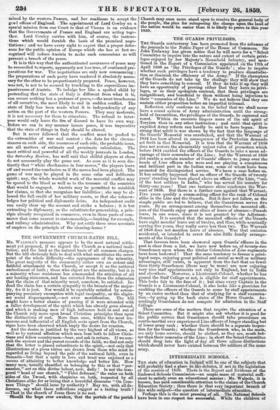THE GOVERNMENT CHURCH-RATES BILL.
Mn. WALPOLE'S measure appears to be the most natural settle- ment yet 'proposed, if we regard the Church as a national insti- tution, and the land as the natural basis of all common charges. But the bill obviously fails to deal with what constitutes the screw point of the whole difficulty—the oppugnance of the minority. The great majority of the community either own an ardent and faithful attachment to the Church, or accept it as the national embodiment of faith ; those who object are the minority, but it is a minority whose resistance has commanded the attention of all our leading statesmen, and has extorted from them the admission that the claim of that minority must, somehow, be satisfied. In- deed the claim has a certain sympathy in the breasts of the major- ity, for it is just. Nor would it be equitably satisfied by accom- panying pecuniary exemption with legal inequality, or the slight- est social disparagement,—not even mortification. The bill might have a better chance of passing if it were attended with a fuller development of the spirit which has already gone abroad, and which is making men of high influence both in and out of the Church rely more upon broad Christian principles than upon the distinctions of sect. More than once, within the most nu- merous and influential of all English sects apart from the Church, signs have been observed which imply the desire for reunion. And the desire is justified by the very highest of all views, as well as by natural affection which men bear both to fellow Chris- tians and fellow countrymen—bear, and ask in return. If we con- sult the ancient and the purest records of the faith, we find not only that the letter is placed subordinate to the spirit,—not only that illustrations of a pious virtue are drawn from those who must be regarded as living beyond the pale of the national faith, even in Samaria—but that a unity in love and trust was enjoined as a means of attaining to better knowledge and better life. How many men, usually classified as belonging to this or that "per- suasion," act on this divine behest, now, daily ! Is not the tem- poral "head of our church," "Fidei defensor," the ruler on both sides of the Tweed, with chaplains on both, respected by all Christians alike for or hiring that a beautiful discourse "On Com- mon Things" should issue by authority ? May we, with all de- ference, say what these reflections suggest as a lasting truth ? —That in tlie church of Jesus there is no sect.
Should the hope ever awaken, that the portals of the parish
Church may once more stand open to receive the general body of the people, the plan for reimposing the charge upon the land of the nation would be easier than it is likely to prove in this year 1859.


































 Previous page
Previous page